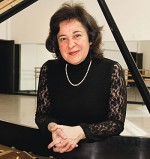Column Name
Title
The Juilliard faculty possesses an arsenal of marvelous and original talents in the field of composition. Many of these teachers, whether they’re in the Pre-College, College, or Evening divisions, are internationally known and are continuously being commissioned for new works, which have been performed by important orchestras, top-notch solo and chamber musicians, and opera, ballet, and theater companies. They have also been recorded by major labels, published in leading editions, and received important awards.
Body
But how much do we know about these composers? Very little, in many cases. That’s unfortunate. They deserve a special place in the curriculum, and the students should have opportunities to get to know them and their music and to perform and record their works. Having one concert per semester dedicated to the music of our faculty composers performed by our excellent student body will raise the interest inside and outside Juilliard.
By working directly with composers, students have the opportunity to influence the compositional process while the works are still in progress. My experience as a pianist has proved that collaboration produces positive results. Upon hearing a work performed for the first time, composers will often make adjustments based on the performer’s interpretation. I have often found composers very willing to agree to change, or modify according to the instrument’s possibilities or limitations, or the performer’s special artistic personality. I would like to think that we, the interpreters, are sometimes the co-creators of these works.
When I was a student at Juilliard, my teacher, Josef Raieff (’32, piano; faculty 1945-2000), was devoted to all kinds of repertory, but he understood the importance of caring for the composers while they were still alive. As a result, I worked closely with student composers and their teachers and premiered their works, and my first commercial recording was made possible thanks to my affiliation with one of these young composers, Samuel Zyman (M.M. ’84, D.M.A. ’87, composition; faculty 1986-present), a classmate of mine. My repertoire, which included a lot of the standards of the piano literature, widened as I got to know more new music. As intelligent musicians, we must learn to distinguish the well-composed works from the mediocre ones, regardless of the stylistic trends.
For many years, Juilliard has been recording some of the concerts where major works were presented for the first time. Why not take them from the vault and release them as part of a CD series of Juilliard’s history? Why not record all the composers we have now and promote them as they should be promoted? Juilliard could benefit in many ways by creating a recording label that would, year after year, promote this group of incredible musicians. It is the varied styles, personalities, concepts, and new technology used by our composers that will define the sound of the 21st century.
If you want to talk more with me about these issues, email me at mconti@juilliard.edu.





